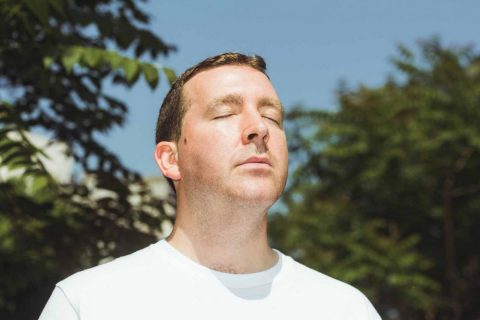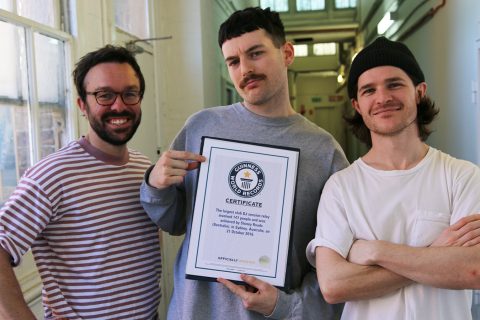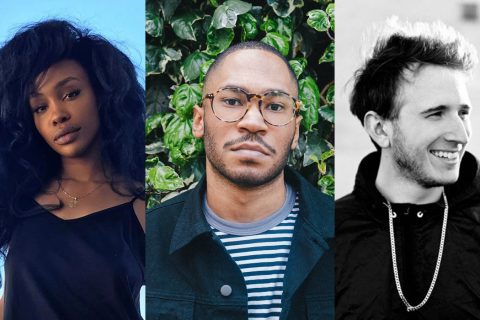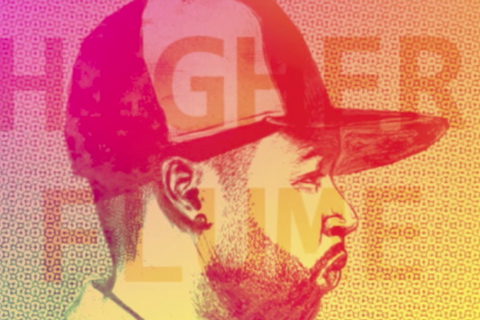Following on from a stellar Essential Mix, Joe Goddard has proven once again that he has little to no limits on his eclectic take on electronic music. We saw it with his huge lead single ‘Music Is The Answer‘, and we’re seeing it again with the full ‘Electric Lines’ record.
So with the release of what is his second solo studio album buzzing in our minds today, we decided to give the veteran producer Joe Goddard’s a call and pick his brain.
Stoney Roads: Electric Lines just came out. How are you feeling? Excited, nervous, all of the above?
Joe: Yeah man, both of those things. Like really nervous to see how it’s received. I mean, I’ve put in a lot of effort and work into making it. I really tried to stretch myself in terms of making the best thing that I possibly could. So, I’m kind of nervous to just see if anyone gets to hear it or whether it gets passed over super quickly like a lot of records do these days, so pretty nervous. But also really excited to get stuck into some live shows and develop that and get that as good as it possibly can be. Thats kind of the thing I’m most excited about.
SR: Having had such a prolific career, being one of the founding members of Hot Chip, and now more recently The 2 Bears, why now have you decided to go for the solo album? has growing up had anything to do with this?
Joe: Nah, I mean it was the first kind of real moment that I had when there wasn’t something else going on. I had a bit of free time that I could devote to making this record and it was kind of cool as it coincided with getting a studio space in Shoreditch, in London, which made making a solo record just seem like the right idea and the best thing that I could do, because I was kind of in there with all of my gear, all of the synthesisers that I’ve been buying over the years, with them all out and ready to go, and I was just really enjoying myself. Alone and exploring these different machines and making stuff with them. It just felt like it all came together in a nice way.
SR: One thing that I’ve really enjoyed about the album is the multiple genres you’ve included. I’ve noticed that a lot of artists these days are utilising a wide variety of genres in their albums, what’s made you do this?
Joe: Honestly, I didn’t think about it too much. For me that’s just what sort of comes out naturally when I’m in the studio making stuff. From day to day I like to have a go at very different types of things, that’s what I enjoy really, that’s essentially it. Over the years I’ve been a big fan of hip-hop, garage, disco, and all these things and trying to take time to make something of all that different stuff is what just comes naturally, it’s what keeps me creatively satisfied.
SR: You’ve been hitting the London clubs for nearly two decades now, do you still draw inspiration from those outings? Do you feel that they impact your creative process?
Joe: Yeah, all the time man. I mean it’d be kind of crazy if they didn’t in a way. When you’re making music for a club you’re trying to create those amazing moments that you remember. I remember seeing Romanthony play live in Fabric, just after it had opened in London, and he did this amazing live show where he was playing some of his classic old tracks like “Bring You Up”, and things like this and it was just an awesome night and an awesome moment that I’ll never forget. And you’re inspired by that all the time. Just trying to make things that have that sense of excitement and funk that means people are going to go nuts in a club. I’m really driven to try and do that, to try and create those moments that bring people together and make people just go crazy. It’s a massive inspiration and there are so many special memories of different times in clubs over the years.
SR: I was reading something you said in an article a little while back, about finding music that’s a little quirky and weird at points, but manages to find its way into the mainstreams consciousness. Are you trying to push something like that across with this album?
Joe: Yeah absolutely! That type of music is really exciting to me. I love that type of pop music that’s a bit left field and on its own. I think it’s super cool when a record can be left of centre and kind of experimental, but also break through. That just gives me this massive pleasure, because I guess that just means that it’s accessible music. My ear is drawn to accessible poppy kind of music a lot naturally. But you want there to be those other layers of interesting stuff going on and kind of like crazy synths in the background, and the crazy rhythms. Musically that’s one of the best things you can get really.
SR: This album seems really polished and considering where you are in your career some people may regard you as a perfectionist. I’ve always found, personally, that the demo carries with it a little more feeling and is a little more raw, do you feel that or are you more on the perfectionist side of things?
Joe: That’s an interesting question isn’t it because that’s something that’s really really relevant to this record, because you can totally see both sides of that. Demos do sometimes have little more soul to them because they are less perfected and less produced, maybe the mix is slightly crazy, or the vocal hasn’t been auto-tuned, or the drums haven’t been so quantised, and in some ways that makes the record more perfect if its got those inconsistencies and slight kind of crazy decisions and weirdness. In a way you could say that makes a record more perfect because it has more life and it’s more loveable, more human. But at the same time, sometimes there are issues that you need to fix about a demo. Sometimes the mix means it’s gonna sound shit through laptop speakers and you need to fix that problem. So you’ve got to think about all those issues and it’s really hard to know when to draw the line, how much to produce a track, which of those sets do you do and which don’t you do. That’s a really difficult thing to learn and I think all producers and all bands have issues with that, whether the demo had something that the finished version has lost. I think everyone goes through that and it’s tough to make that decision. I find it difficult myself, but the only way you can kind of solve it is by listening, stepping back from the track and leaving it for a few weeks and then listening again and then really trying to, objectively, go through it and work out what needs to happen and what should be left the same.
SR: Sitting on the fence of the perfectionist/ demo debate, what songs did you find yourself constantly coming back to? What took the longest?
Joe: The one’s that took the longest to finish were “Lose Your Love” and “Children”. Those two were very difficult to get done. I tried hundreds of versions of those tracks, I tried mixing with very different people. It was a pretty kind of crazy process of trying to work out what’s best, is this working? Is that versions better? All the stuff that a lot of producers go through I totally went through on those songs. And sometimes it’s super difficult because when you’ve been working on a track that much, once you’ve done that you sometimes end up losing interest in it, so then finishing it becomes super hard because you find it difficult to even listen to for a while, a few months you know. It’s tough. Conversely, other tracks can just come together so fast that you can’t even believe it. You make a demo, someone sings on it and it’s done in like two days and that just feels so amazing. Albums are always like that, you always have certain songs that come together really naturally and other one’s that you have to work harder at.
SR: Where did you get all the inspiration for your solo album? I know you’re a Londoner, has living there with all the musical genres that Britain is famous for in the modern era had an influence on this album?
Joe: Yeah, I mean that’s a big part of it. I guess a lot cities are very multicultural and very good in terms of there being a lot of different kinds of music. Melbourne and Sydney are really amazing musical citifies as well. So I don’t think it’s particular to London, but I did have an amazing time growing up and seeing a lot of different styles. People going to reggae nights, people going to garage nights, and hip-hop nights, and to jungle nights, all of this cultural life definitely helps. The last few years I haven’t done as much of that, I have two kids and I’m working as a DJ quite a lot, so Im not going to as many club nights like a I did when I was fifteen or whatever. But, I guess DJing and all of the music that you come into contact with through that is a big inspiration and I just try to call upon all of the stuff that I loved over the years and try and bring it together into this record. All of the different producers that I’ve been obsessed with and all the different tracks that I’ve played out over the years, and the things that blow my mind, all of that kind of stuff.
SR: What are your thoughts, being a DJ and someone who respects the craft, on the commercialisation of dance music? The fact that people pay hundreds of dollars to go sit and stand in a football stadium and watch some guy push some buttons as opposed to actually going out to a club, where personally I think you getter a better experience and feel for the music.
Joe: (laughs) Well I mean, I don’t really have any hatred for those guys. It doesn’t come naturally to me as a way to spend my time, to go and see something like that, honestly I don’t think I’ve ever bought tickets to that kind of event. But, it’s cool if people are into that I don’t have a problem with it. For me the most natural way to listen to DJs is definitely in a tiny club with a good system and basically no lights, that’s where I feel happy. A small place where you can hear the music up close and personal and you’re just dancing not really looking at anything you know, you’re just dancing with your friends. That’s when I’m happy.
SR: I find to often that I’m in a crowd and everyone is budding for prime position, which is up close to the DJ. What are your thoughts about a DJ performing on a stage as opposed to down near or amongst the crowd?
Joe: In terms of from a DJ’s perspective it’s definitely the most fun and most exciting when you’re really close to the crowd and on their level rather than being on stage. That’s what I enjoy, when you’re close up to people while their dancing, because then you get inspired by the people dancing in front of you. If you’ve got a couple of people dancing in front of you that are really going for it and really clearly having a wicked time then you play much better as a DJ, you really vibe off that and your set becomes far more funkier and everything just seems to roll much better.
SR: Couldn’t agree more with you Joe, thank you for taking the time to speak to Stoney Roads and with me, can’t wait till the album drops!
Joe: Cheers man, bye
–
Be sure to give Joe’s album ‘Electric Lines’ a good listen below and let us know what you make of it.





Comments